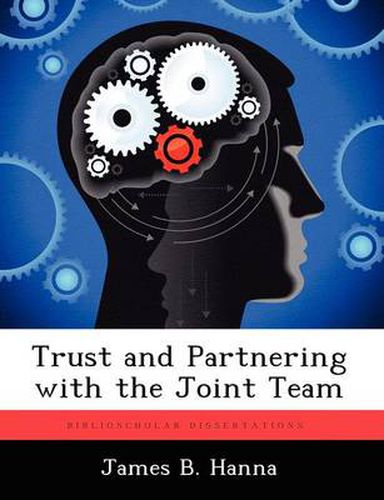Readings Newsletter
Become a Readings Member to make your shopping experience even easier.
Sign in or sign up for free!
You’re not far away from qualifying for FREE standard shipping within Australia
You’ve qualified for FREE standard shipping within Australia
The cart is loading…






This title is printed to order. This book may have been self-published. If so, we cannot guarantee the quality of the content. In the main most books will have gone through the editing process however some may not. We therefore suggest that you be aware of this before ordering this book. If in doubt check either the author or publisher’s details as we are unable to accept any returns unless they are faulty. Please contact us if you have any questions.
The 19th Chief of Staff of the Air Force (CSAF) listed five priorities in the 2008 Air Force Strategic Plan, the second of which is to Partner with the Joint and Coalition team to win today’s fight. To identify priority areas to improve supporting the Joint team, the CSAF Executive Action Group surveyed all Combatant Commanders, their Air Component Commanders, and several senior Air Force mentors. The surveys did not include members of Coalition teams leading to this study being focused solely on Joint Partnering. The comments from the survey concluded that trust may be the most fundamental issue requiring attention between the Air Force and the Joint team. To fully understand the issue, this study discusses the factors that have been shown to contribute to the development of trust, how the Air Force can best increase trust and use it as a mechanism to increase combat effectiveness with the Joint team. Because trust is difficult if not impossible to quantify, understanding its components allows a more comprehensive analysis. The Cycle of Trust concept introduced in this paper emphasizes the need to address all individual components of the problem before trust can be realized. Finally, the authors apply trust theories to the specific task of increasing trust within the Joint team. The recommendations provided are informed by a year of dedicated study and many years of experience on the part of the interviewees.
$9.00 standard shipping within Australia
FREE standard shipping within Australia for orders over $100.00
Express & International shipping calculated at checkout
This title is printed to order. This book may have been self-published. If so, we cannot guarantee the quality of the content. In the main most books will have gone through the editing process however some may not. We therefore suggest that you be aware of this before ordering this book. If in doubt check either the author or publisher’s details as we are unable to accept any returns unless they are faulty. Please contact us if you have any questions.
The 19th Chief of Staff of the Air Force (CSAF) listed five priorities in the 2008 Air Force Strategic Plan, the second of which is to Partner with the Joint and Coalition team to win today’s fight. To identify priority areas to improve supporting the Joint team, the CSAF Executive Action Group surveyed all Combatant Commanders, their Air Component Commanders, and several senior Air Force mentors. The surveys did not include members of Coalition teams leading to this study being focused solely on Joint Partnering. The comments from the survey concluded that trust may be the most fundamental issue requiring attention between the Air Force and the Joint team. To fully understand the issue, this study discusses the factors that have been shown to contribute to the development of trust, how the Air Force can best increase trust and use it as a mechanism to increase combat effectiveness with the Joint team. Because trust is difficult if not impossible to quantify, understanding its components allows a more comprehensive analysis. The Cycle of Trust concept introduced in this paper emphasizes the need to address all individual components of the problem before trust can be realized. Finally, the authors apply trust theories to the specific task of increasing trust within the Joint team. The recommendations provided are informed by a year of dedicated study and many years of experience on the part of the interviewees.